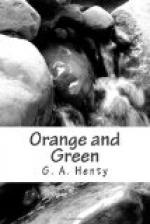Sarsfield and most of his officers, and the priests, used their utmost efforts to persuade the soldiers to enter the French service, in preference to the English. Their exhortations were successful. Only about two thousand Irish joined the British army, four thousand laid down their arms and returned to their homes, and a considerable number deserted on their march down to Cork. The rest were shipped in transports to France, where they entered the service of that country. Two days after the treaty was signed, the French fleet, with ten thousand men and a great abundance of stores, arrived at the mouth of the Shannon.
The Irish negotiators of the treaty have been greatly and deservedly blamed, inasmuch as, while they stipulated that the proprietors of the neighbouring counties should retain their estates, they abandoned those possessing property throughout the rest of Ireland to ruin and beggary. There was no excuse for this. They knew that the French fleet had sailed, and must have arrived in a few days, and that the English cause was becoming so desperate that Ginckle would not have resisted any terms they had laid down. This cruel and wholly unnecessary desertion of their friends has thrown a slur upon the memory of Sarsfield and the other leaders who conducted the negotiations.
The officers and men who entered the service of France had bitter reason to repent their decision. Instead of being, as they expected, kept together in regiments, they were for the most part broken up and distributed throughout the French army. Louis was deeply enraged at the surrender, just as the expedition he had made such efforts to send for the conquest of Ireland was within a few hours’ sail of its shores, and he treated the whole of the Irish and French who returned from Ireland as men who had acted the part of traitors.
As soon as the terms of capitulation were arranged, Captain Davenant obtained papers of protection for all the men of his troop. He had formed them up on parade, and had put the question, whether they wished to return home or to enter the service of France.
“I myself, and your officers, intend to return home,” he said. “Of course, each of you is free to do as he chooses; but it appears to me a most foolish thing to leave your country forever, and exile yourself in the service of France, when you are free to return home. You know how little French promises have been kept during this war, and how little faith is to be placed on them in future.”
The men were unanimous in their decision to return to their homes, and, as soon as the protection papers were obtained, the troop disbanded, and all returned to their homes and occupations in and around Bray.
It was a joyful meeting, when Captain Davenant and Walter returned to the castle. Mrs. Davenant had always shared her husband’s opinion, that the chances of ultimate success were small, and of late even his mother had given up hope, and both were delighted that their anxieties were at last over, and husband and son restored to them in safety. There was an immense deal to tell on both sides, for it was months since any letter had passed between them.




